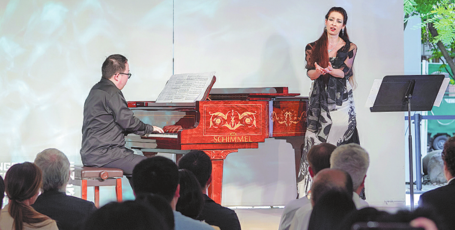Mahler's music paints his descendant's art

Music lover Xiao Shitou never imagined she could watch a live performance of Gustav Mahler's (1860-1911) art songs in her home city while learning about the Austrian composer's life through narratives presented by his descendant.
"Mahler's works convey something beyond words," she says. "They offer profound solace and inner strength when I'm facing life's most challenging and frustrating moments."
Xiao was attending the activity, The Past and Present of Mahler's Art World. Held on May 28 at the White Night Poetry Space in Chengdu, Sichuan province, the event hosted by the city's foreign affairs office and Austria's consulate general in Chengdu aims to facilitate cultural exchanges and people-to-people connections between China and Austria.
Accompanied by Chinese pianist Wang Xinyuan, Austrian soprano Claudia Puhr presented three of Mahler's art songs — Erinnerung (Memory), Fruhlingsmorgen (Spring Morning) and Liebst du um Schonheit (If You Love for Beauty). In between the performance, pixelism artist Peter Mahler, a descendant of Gustav Mahler, shared insights into the composer's life and creative journey.
The event also featured an exhibition showcasing two dozen representative works by Peter Mahler, including portraits of his ancestor, composer Gustav Mahler. It marks the artist's first exhibition in China.
"As a pianist, my greatest regret is falling in love with Gustav Mahler's music only to find he focuses on symphonic works," Wang says.
He says he feels privileged to perform the composer's rare piano pieces at the event.
Wang has been captivated by the composer's symphonies since age 16, when he first listened to Symphony No 6 in A Minor.
"Gustav Mahler's works have influenced me profoundly — even more than Chopin's piano compositions. His music fundamentally shaped my outlook on life," Wang says.
"Listening to his music is like traversing through the Purgatory in Dante's Divine Comedy. You need to sink yourself deeply enough into it before finding your way to the light," Wang says.
Peter Mahler describes the composer's life story as an exploration of the indomitable human spirit.
The composer's father had a violent temper and often beat his wife and children. One day, after witnessing his father beating his mother yet again, young Gustav Mahler fled his home and heard a street musician playing a barrel organ, performing the folk tune, Ach, du lieber Augustin (Oh, You Dear Augustin).
This childhood experience became the bedrock of his lifelong artistic creation.
"Gustav Mahler endured extraordinary hardships, from childhood trauma to his daughter Maria's death and his own heart disease," says the painter.
"Yet he never lost his passion for life, imbuing his music with extraordinary compassion for humanity. His life teaches us that every experience, even painful ones, holds meaning and value. Every individual possesses the potential to transform pain and suffering into something beautiful."
Peter Mahler says he often paints while listening to the composer's music, letting the notes guide his creation like a mentor.
He uses his hands instead of brushes.
"My hands and fingers would move to his music, making certain parts of it visible," he says.
Renowned as an interdisciplinary practitioner of Neoclassicism and Modernism, the artist believes his connection with the composer lies in their shared exploration of groundbreaking artistic paths.
Just as human bodies share the same essential composition, Peter Mahler says his artworks are created using pixels, implying the connections between people.
During his China trip, the artist also visited Emei Mountain and the Leshan Giant Buddha in Sichuan, where he immersed himself in Chinese Buddhist culture.
"I was deeply touched by the heartwarming signs along the way, as well as the incredibly friendly people, which truly melted my heart," he says.
Since China has implemented a visa-free policy for Austria, Peter Mahler says he expects more cultural exchanges between the two nations and looks forward to creating works incorporating Chinese elements. "I've fallen in love with China. Even after returning home, part of my heart will always remain here," he says.


Today's Top News
- Crossing a milestone in the journey called Sinology
- China-Russia media forum held in Beijing
- Where mobility will drive China and the West
- HK community strongly supports Lai's conviction
- Japan paying high price for PM's rhetoric
- Japan's move to mislead public firmly opposed






























